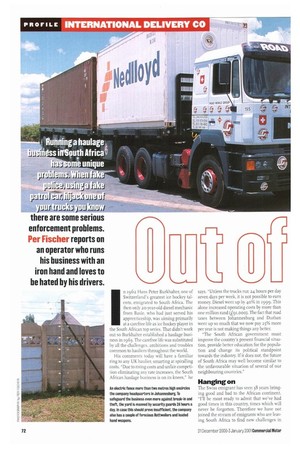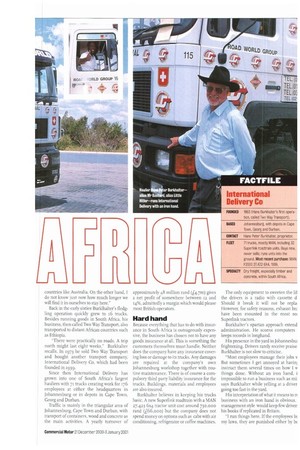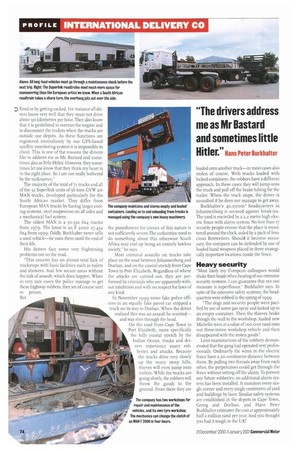1 n 1962 Hans Peter Burkhalter, one of
Page 74

Page 75

Page 76

If you've noticed an error in this article please click here to report it so we can fix it.
Switzerland's greatest ice hockey talents, emigrated to South Africa. The then only 20-year-old diesel mechanic from Basle. who had just served his apprenticeship, was aiming primarily at a carefree life as ice hockey player in the South African top series. That didn't work out so Burkhalter established a haulage business in 1963. The carefree life was substituted by all the challenges, ambitions and troubles common to hauliers throughout the world.
His comments today will have a familiar ring to any UK haulier, smarting at spiralling costs. "Due to rising costs and unfair competition eliminating any rate increases, the South African haulage business is on its knees," he says. "Unless the trucks run 24 hours per day seven days per week, it is not possible to earn money. Diesel went up by 40% in 1999. This alone increased operating costs by more than one million rand (t9i,000). The fact that road taxes between Johannesburg and Durban went up so much that we now pay 25% more per year is not making things any better.
"The South African government must improve the country's present financial situation, provide better education for the population and change its political standpoint towards the industry. if it does not, the future of South Africa may well become similar to the unfavourable situation of several of our neighbouring countries."
Hanging on
The Swiss emigrant has seen 38 years bringing good and bad to the African continent. "I'll be most ready to admit that we've had good times in this country, times which will never be forgotten. Therefore we have not joined the stream of emigrants who are leaving South Africa to find new challenges in countries like Australia. On the other hand, I do not know just now how much longer we will find it in ourselves to stay here."
Back in the early sixties Burklhalter's fledgling operation quickly grew to 16 trucks. Besides running goods in South Africa, his business, then called Two Way Transport, also transported to distant African countries such as Ethiopia.
"There were practically no roads. A trip north might last eight weeks," Burkhalter recalls. In 1973 he sold Two Way Transport and bought another transport company, International Delivery Co, which had been founded in 1939.
Since then International Delivery has grown into one of South Africa's largest hauliers with 7! trucks creating work for 176 employees at either the headquarters in Johannesburg or in depots in Cape Town, Georg and Durban.
Traffic is mainly in the triangular area of Johannesburg, Cape Town and Durban, with transport of containers, wood and concrete as the main activities. A yearly turnover of approximately 48 million rand (i4.7m) gives a net profit of somewhere between 12 and 14%, admittedly a margin which would please most British operators.
Hard hand
Because everything that has to do with insurance in South Africa is outrageously expensive, the business has chosen not to have any goods insurance at all. This is something the customers themselves must handle. Neither does the company have any insurance covering loss or damage to its trucks. Any damages are repaired at the company's own Johannesburg workshop together with routine maintenance. There is of course a compulsory third party liability insurance for the trucks. Buildings, materials and employees are also insured.
Burkhalter believes in keeping his trucks basic. A new Superlink roadtrain with a MAN 27.423 6x.4 tractor unit cost around 73o,000 rand (L66,000) but the company does not spend money on options such as cabs with air conditioning, refrigerator or coffee machines. The only equipment to sweeten the lif the drivers is a radio with cassette d Should it break it will not be replai However, for safety reasons, exhaust brz have been mounted in the most re Superlink tractors.
Burkhalter's spartan approach extend administration. He scorns computers keeps records in longhand.
His presence in the yard in Joh annesbtu frightening. Drivers rarely receive praise Burkhalter is not slow to criticise.
Most employees manage their jobs v But sometimes I get annoyed at havitil instruct them several times on how I v+ things done, Without an iron hand, i impossible to run a business such as mui says Burkhalter while yelling at a driver going too fast in the yard.
His interpretation of what it means to n business with an iron hand is obvious, management style would keep few driver his books if replicated in Britain.
"I run things here. If the employees bi my laws, they are punished either by b( fined or by getting sacked. For instance all drivers know very well that they must not drive above 90 kilometres per hour. They also know that it is prohibited to overrun the engine and to disconnect the trailers when the trucks are outside our depots. As these functions are registered immediately by our CPS-based satellite monitoring system it is impossible to cheat. This is one of the reasons the drivers like to address me as Mr. Bastard and sometimes also as little Hitler. However, they sometimes let me know that they think my heart is in the right place. So I am not really bothered by the nicknames."
The majority of the total of 71 trucks and all of the 32 Superlink units of 36 tons GVW are MAN trucks, developed particularly for the South African market. They differ from European MAN trucks by having larger cooling systems, steel suspension on all axles and a mechanical fuel system.
The oldest MAN is a 30.330 6x4 tractor from 1979. The latest is an F 2000 27.432 6x4 from 1999. Oddly. Burkhalter never sells a used vehicle—he runs them until the end of their life.
His drivers face some very frightening problems out on the road.
This country has an almost total lack of truckstops with basic facilities such as toilets and showers. And few secure areas without the risk of assault, which does happen. When in very rare cases the police manage to get these highway robbers, they are of course sent to prison.
But the punishment for crimes of this nature is not sufficiently severe.The authorities need to do something about this otherwise South Africa may end up being an entirely lawless society." he says.
Most criminal assaults on trucks take place on the road between Johannesburg and Durban, and on the coastal stretch from Cape Town to Port Elizabeth. Regardless of where the attacks are carried out, they are performed by criminals who are apparently without inhibition and with no respect for laws of any kind.
In November 1999 some fake police officers in an equally fake patrol car stopped a truck on its way to Durban. When the driver realised this was an assault he resisted— and was shot through the head.
On the road from Cape Town to Port Elizabeth, more specifically the hilly coastal stretch by the Indian Ocean, trucks and drivers experience many robberies and attacks. Because the trucks drive very slowly up the many steep hills, thieves will even jump onto trailers. While the trucks are going slowly, the robbers will throw the goods to the uround. From there they are loaded onto another truck—in most cases also stolen of course. With trucks loaded with locked containers, the robbers have a different approach. In these cases they will jump onto the truck and pull off the brake tubing for the trailer. When the truck stops. the driver is assaulted if he does not manage to get away.
Burkhalter's 4o,000m2 headquarters in Johannesburg is secured against break-ins. The yard is encircled by a 2.2 metre high electric fence with alarm system. No less than 17 security people ensure that the place is monitored around the clock, aided by a pack of ferocious Rottweilers. Should it become necessary, the company can be defended by use of loaded hand weapons placed in three strategically important locations inside the fence.
Heavy security
"Most likely my Furopean colleagues would shake their heads when hearing of our extensive security systems. I can guarantee that not one measure is superfluous," Burkhalter says. In spite of the extensive safety systems, the headquarters were robbed in the spring 011999.
'The dogs and security people were pacified by use of some gas spray and locked up in an empty container. Then the thieves broke though the wall to the workshop, loaded new Michelin tyres at a value of Too.° oo rand onto our three-tonne workshop vehicle and then disappeared with the stolen goods".
Later examinations of the robbery demonstrated that the gang had operated very professionally. Ordinarily the wires in the electric fence have a 20 centimetre distance between them. By pulling two threads away from each other, the perpetrators could get through the fence without setting ()lithe alarm. To prevent any future robberies, an additional alarm system has been installed. It monitors every single corner and every single centimetre of yard and buildings by laser. Similar safety systems are established in the depots in Cape Town, Georg and Durban, and Hans Peter Burkhalter estimates the cost at approximately half a million rand per year. And you thought you had it tough in the UK!








































































































































